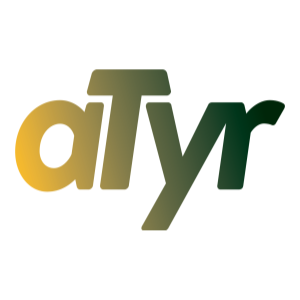aTyr Pharma Announces Findings from Interim Analysis of Ongoing Phase 2 EFZO-CONNECT™ Study of Efzofitimod in Systemic Sclerosis-Related Interstitial Lung Disease (SSc-ILD)
Rhea-AI Summary
Positive
- 3 out of 4 efzofitimod-treated diffuse SSc-ILD patients showed clinically important improvement in skin fibrosis at 12 weeks
- All patients showed stable or improved modified Rodnan Skin Score (mRSS)
- Preliminary signals show improvement in inflammatory and disease biomarkers
- Drug demonstrated good safety profile with no treatment-related serious adverse events
- Product has received FDA Fast Track and Orphan Drug designations
Negative
- Small interim analysis sample size of only 8 patients
- Early 12-week data, pending full 24-week endpoint results including lung function
- Final study results and regulatory approval still pending
News Market Reaction
On the day this news was published, ATYR declined 4.64%, reflecting a moderate negative market reaction.
Data tracked by StockTitan Argus on the day of publication.
Three out of four efzofitimod-treated diffuse SSc-ILD patients showed clinically important improvement based on the modified Rodnan Skin Score (mRSS) assessment at 12 weeks.
Efzofitimod was generally safe and well tolerated at all doses.
SAN DIEGO, June 04, 2025 (GLOBE NEWSWIRE) -- aTyr Pharma, Inc. (Nasdaq: ATYR) (“aTyr” or the “Company”), a clinical stage biotechnology company engaged in the discovery and development of first-in-class medicines from its proprietary tRNA synthetase platform, today announced findings from an interim analysis of eight patients in the ongoing Phase 2 EFZO-CONNECT™ study evaluating its lead therapeutic candidate, efzofitimod, in patients with limited or diffuse systemic sclerosis (SSc, or scleroderma)-related interstitial lung disease (ILD).
“We are excited to see early signals emerging across multiple skin assessment measures from this initial interim analysis, and we are particularly encouraged by the stable or improved modified Rodnan Skin Score (mRSS), a measure of skin fibrosis, seen in all patients,” said Sanjay S. Shukla, M.D., M.S., President and Chief Executive Officer of aTyr. “Remarkably, even at this early 12-week timepoint, we observed meaningful improvement in three out of four efzofitimod-treated patients with diffuse SSc-ILD, a more severe form of the disease. mRSS is a sensitive clinical outcome measure, particularly for diffuse patients, so we consider this trend quite promising. As we continue enrollment and move toward the 24-week endpoints, including lung function as the primary endpoint to evaluate the ILD component of the disease, we look forward to providing additional updates upon completion of the trial.”
The interim analysis evaluated skin assessments and serum biomarkers at baseline and week 12 for efzofitimod and placebo patients. Eight patients from the study were evaluated, including five with diffuse and three with limited SSc-ILD.
Key findings to date for efzofitimod include:
- Stable or improved mRSS for all patients and an improvement of 4 points or greater for three out of four efzofitimod-treated patients with diffuse SSc-ILD, where the minimal clinically important difference (MCID) is a 4 to 6 point improvement at 12 months
- Preliminary signals of improvement for inflammatory biomarkers including interferon gamma (IFN-γ) and monocyte chemoattractant protein-1 (MCP-1) and disease biomarkers Krebs von den Lungen-6 (KL-6) and surfactant protein-D (SP-D)
- Generally safe and well tolerated at all doses, with no treatment related serious adverse events
EFZO-CONNECT™ is a Phase 2 randomized, double-blind, placebo-controlled, proof-of-concept study to evaluate the efficacy, safety and tolerability of efzofitimod in patients with limited or diffuse SSc-ILD. This is a 28-week study with three parallel cohorts randomized 2:2:1 to either 270 mg or 450 mg of efzofitimod or placebo dosed intravenously monthly for a total of 6 doses. The study intends to enroll up to 25 patients at multiple centers in the United States. Patients who complete the study are eligible to participate in a 24-week open-label extension. The primary objective of the study is to evaluate the efficacy of multiple doses of intravenous efzofitimod on pulmonary, cutaneous and systemic manifestations in patients with SSc-ILD. Secondary objectives include safety and tolerability.
More information on the EFZO-CONNECT™ study is available at www.clinicaltrials.gov (NCT05892614).
Efzofitimod has been granted U.S. Food and Drug Administration (FDA) and European Union orphan drug and U.S. FDA Fast Track designations for SSc.
About SSc-ILD
Systemic sclerosis is a chronic, progressive, autoimmune disease characterized by inflammation and fibrosis of connective tissues throughout the body, including the skin and other internal organs. SSc that occurs in the lungs is called SSc-ILD. It is estimated that approximately 100,000 people in the U.S. are affected by SSc and up to
About Efzofitimod
Efzofitimod is a first-in-class biologic immunomodulator in clinical development for the treatment of interstitial lung disease (ILD), a group of immune-mediated disorders that can cause inflammation and fibrosis, or scarring, of the lungs. Efzofitimod is a tRNA synthetase derived therapy that selectively modulates activated myeloid cells through neuropilin-2 to resolve inflammation without immune suppression and potentially prevent the progression of fibrosis. aTyr is currently investigating efzofitimod in the global Phase 3 EFZO-FIT™ study in patients with pulmonary sarcoidosis, a major form of ILD, and in the Phase 2 EFZO-CONNECT™ study in patients with systemic sclerosis (SSc, or scleroderma)-related ILD. These forms of ILD have limited therapeutic options and there is a need for safer and more effective, disease-modifying treatments that improve outcomes.
About aTyr
aTyr is a clinical stage biotechnology company leveraging evolutionary intelligence to translate tRNA synthetase biology into new therapies for fibrosis and inflammation. tRNA synthetases are ancient, essential proteins that have evolved novel domains that regulate diverse pathways extracellularly in humans. aTyr’s discovery platform is focused on unlocking hidden therapeutic intervention points by uncovering signaling pathways driven by its proprietary library of domains derived from all 20 tRNA synthetases. aTyr’s lead therapeutic candidate is efzofitimod, a first-in-class biologic immunomodulator in clinical development for the treatment of interstitial lung disease, a group of immune-mediated disorders that can cause inflammation and progressive fibrosis, or scarring, of the lungs. For more information, please visit www.atyrpharma.com.
Forward-Looking Statements
This press release contains forward-looking statements within the meaning of the Private Securities Litigation Reform Act of 1995. Forward-looking statements are usually identified by the use of words such as "anticipate," “believes,” “designed,” “could,” “can,” “expects,” “intends,” “may,” “plans,” “potential,” “will,” and variations of such words or similar expressions. We intend these forward-looking statements to be covered by such safe harbor provisions for forward-looking statements and are making this statement for purposes of complying with those safe harbor provisions. These forward-looking statements include, among others, statements regarding the findings from the interim analysis of the Phase 2 EFZO-CONNECT™ study and the potential for similar promising findings upon trial completion; timelines and plans with respect to the enrollment of patients, achievement of future endpoints and completion of the Phase 2 EFZO-CONNECT™ study; and certain development goals and activities for the Phase 2 EFZO-CONNECT™ study. These forward-looking statements also reflect our current views about our plans, intentions, expectations, strategies and prospects, which are based on the information currently available to us and on assumptions we have made. Although we believe that our plans, intentions, expectations, strategies and prospects, as reflected in or suggested by these forward-looking statements, are reasonable, we can give no assurance that the plans, intentions, expectations, strategies or prospects will be attained or achieved. All forward-looking statements are based on estimates and assumptions by our management that, although we believe to be reasonable, are inherently uncertain. Furthermore, actual results may differ materially from those described in these forward-looking statements and will be affected by a variety of risks and factors that are beyond our control including, without limitation, uncertainty regarding geopolitical and macroeconomic events, risks associated with the discovery, development and regulation of efzofitimod, the risks associated with clinical trials generally, the risk that future findings may not reflect the findings from the interim analysis discussed above, the risk that we or our partners may cease or delay preclinical or clinical development activities for efzofitimod for a variety of reasons (including difficulties or delays in patient enrollment in planned clinical trials), the possibility that existing collaborations could be terminated early, and the risk that we may not be able to raise the additional funding required for our business and product development plans, as well as those risks set forth in our most recent Annual Report on Form 10-K, Quarterly Reports on Form 10-Q and in our other SEC filings. Except as required by law, we assume no obligation to update publicly any forward-looking statements, whether as a result of new information, future events or otherwise.
Contact:
Ashlee Dunston
Sr. Director, Investor Relations and Public Affairs
adunston@atyrpharma.com








